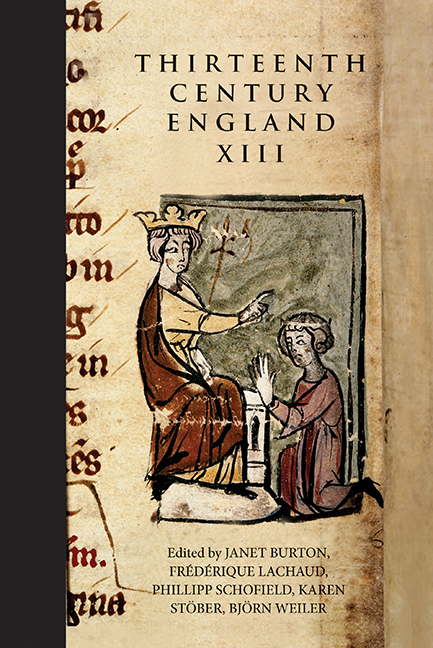Book contents
- Frontmatter
- Contents
- List of Illustrations
- Preface
- Contributors
- Abbreviations
- Political Ideas and Dialogue in England in the Twelfth and Thirteenth Centuries
- Peripatetic and Sedentary Kingship: The Itineraries of John and Henry III
- Peter of Aigueblanche's Support Network
- A Captive King: Henry III between the Battles of Lewes and Evesham, 1264–5
- The Conflictus inter Deum et Diabolum and the Emergence of the Literature of Law in Thirteenth-Century England
- Prosecuting Ravishment in Thirteenth-Century England
- John of Crakehall: The ‘Forgotten’ Baronial Treasurer, 1258–60
- Credit Finance in Thirteenth-Century England: The Ricciardi of Lucca and Edward I, 1272–94
- (Socio)linguistic Realities of Cross-Channel Communication in the Thirteenth Century
- The Treaties of Paris
(Socio)linguistic Realities of Cross-Channel Communication in the Thirteenth Century
Published online by Cambridge University Press: 15 September 2017
- Frontmatter
- Contents
- List of Illustrations
- Preface
- Contributors
- Abbreviations
- Political Ideas and Dialogue in England in the Twelfth and Thirteenth Centuries
- Peripatetic and Sedentary Kingship: The Itineraries of John and Henry III
- Peter of Aigueblanche's Support Network
- A Captive King: Henry III between the Battles of Lewes and Evesham, 1264–5
- The Conflictus inter Deum et Diabolum and the Emergence of the Literature of Law in Thirteenth-Century England
- Prosecuting Ravishment in Thirteenth-Century England
- John of Crakehall: The ‘Forgotten’ Baronial Treasurer, 1258–60
- Credit Finance in Thirteenth-Century England: The Ricciardi of Lucca and Edward I, 1272–94
- (Socio)linguistic Realities of Cross-Channel Communication in the Thirteenth Century
- The Treaties of Paris
Summary
The purpose of this article is to investigate how communication across the English Channel functioned during (at least mainly) the thirteenth century. I shall inevitably go a little beyond this chronological limit, since there is often better evidence from later on. Within this fairly broad field of investigation, I will be concerned principally with communication and contact between England and France. Part of the reason for this is simply linguistic: once other countries, whether the Low Countries or Spain, Portugal, Gascony, or Italy, are involved, then clearly different languages come into play. A second reason for restricting myself to England and France is that it fits more readily into the focus of this collection; and finally, it corresponds to the area in which I have some competence.
Those familiar with standard treatments of the history of the French language in England will have encountered the conventional outline of how things developed. This broad picture goes back to late nineteenth-century French philology, and to the origins of the study of Anglo-Norman at or shortly after the beginning of the twentieth century. The emerging disciplines of French medieval studies and of French historical linguistics were deeply imbued, from the outset, with a nationalist agenda within which, amongst other things, it was considered imperative to stress the continuity and purity of standard French. Anglo-Norman, as a visibly aberrant and indeed manifestly non-French variety in terms of geography, was, or would have been, problematic, had it not been marginalized and treated (to quote Gaston Paris) as simply ‘une manière imparfaite de parler français’.
Within the history of Anglo-Norman, the traditional approach was always (and until remarkably recently) to subdivide the history of the variety into two main phases: from the Conquest (1066) to 1204 (the loss of Normandy) was phase one. Phase two after the loss of Normandy (or its recapture from a French perspective) is typically characterized as a period of decline, degeneracy, barbarousness, wholesale contamination by and of English, and so forth. This perspective owes more than a little to the parallel development within English philology of English nationalism, and is influenced by the narrative of the emergence of the heroic English language from under the tyrannical Norman yoke.
- Type
- Chapter
- Information
- Thirteenth Century England XIIIProceedings of the Paris Conference, 2009, pp. 117 - 132Publisher: Boydell & BrewerPrint publication year: 2011

